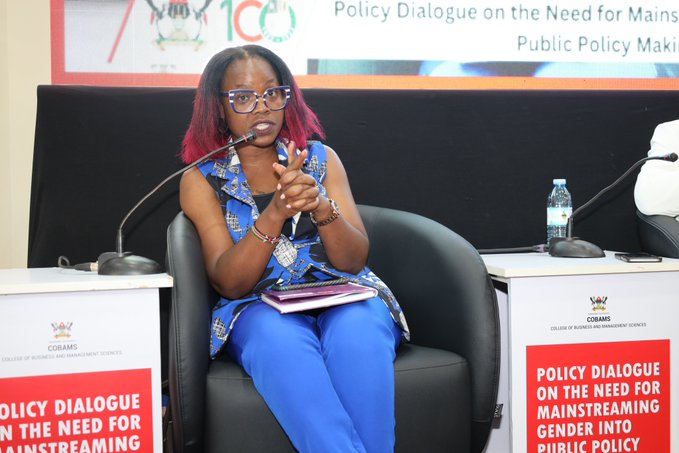Uganda loses about Shs77bn due to gender-based violence, according to Elizabeth Kemigisha, the Advocacy Manager of the Uganda Association of Women Lawyers (FIDA Uganda).
She was speaking Tuesday during a Policy Dialogue on the Rationale/Need for Mainstreaming the Gender Variable into Social/Public Policymaking held at the School of Public Health, Makerere University.
The dialogue included two-panel discussions on mainstreaming the gender variable and gender-based violence.
While speaking during a panel discussion attended by Dr Adibaa Irene, the Deputy Commissioner of the Child and Family Protection Unit at Uganda Police and Dr Jamela B. Hoveni, Institute for Economic Justice, Kemigisha said power imbalance is manifested through many aspects.

“We lose about Shs77bn due to gender-based violence. Perpetrators of gender-based violence have influenced the court process.”
According to her, communities have a role to play in stopping the vice.
“When you say man or woman that is gender and there are things that are expected. There are things we have constructed from our upbringing. A lot of this has been in domination.”
She said what looks like a social issue is as big as macro or governance issues.
On her part, Dr Hoveni said women lose a lot of work due to gender-based violence.

“In South Africa, there are established strategies for stopping gender-based violence in line with six pillars including care, economic empowerment, legal systems, etc. The way we approach issues of economics and rights. It’s from an intersectional perspective.”
She added: “Gender violence is important because it’s a cross-cutting issue. We tend to deal with it as a social issue. We want to look at it as a structural issue. What are the drivers? Gender violence is high around economic crisis.”
Dr. Adibaa Irene, on her part, said many times, kinsmen are shy about talking about GBV because society looks at a man as so powerful.
“The magnitude of domestic violence is so big today, educated or not, it’s affecting everybody. We have seen violence affecting employed people more than unemployed,” noted Dr. Adibaa.

She says the violence starts when men fail to take care of their families.
“Men aren’t doing their part. Today men are competing with women to be in the same space. Families are trying to solve issues on their own which can’t work that’s why we are seeing them running to the police.”
Dr Adibaa, however, noted that the cases of GBV have reduced. “Cases are reported at LC level, Churches, FIDA and they haven’t reached us.”
Power imbalances /discrimination
Speaking during another panel discussion on mainstreaming gender, Agnes Kisembo, a programmes specialist for intergovernmental and gender-responsive budget at the United Nations (UN) Women, said it is not possible to achieve the SDGs by 2030 without addressing discrimination in paid care etc.
“We cannot talk about gender equality/mainstreaming without mentioning who is affected. Access to digital technologies is a male-dominated domain.”
She went on: “Gender roles are more about the women and girls. If a mother is pregnant, the girl will be told to stay home and the boy goes to school. We can’t talk about gender without knowing who is affected.”

She said not everyone is affected the same way and that it’s not wise to discuss anything, especially “on how we are mainstreaming the 17 goals”.
“If we are to realise productivity, we cannot remain theoretical. We need to set serious targets. And this requires consistency. Institutions and individuals have to be held accountable.”
Dr. Euzobia Baine, who represented the Vice Chancellor, Prof Barnabas Nawangwe, said it is now policy that gender mainstreaming has been incorporated in all the university’s programmes.
“For gender mainstreaming, we need a coordinating centre,” she noted.

The Principal of Makerere University College of Business and Management Sciences (CoBAMS), Prof. Eria Hisali, was pleased that the discussions about Gender Equality are moving out of implementing institutions.
Dr David Mpiima, a Lecturer in the School of Women and Gender Studies at Makerere University, said one of the biggest factors on the issue of gender is that of power.

“You will have a boss a woman suffering harassment from a subordinate and vice versa. What are we trying to deal with? Inequality is the issue.” “Whose optimal outcomes, social transformations etc. are we talking about? All of these have gender connotations. For me as a rich man, I am prospering but my family isn’t. Who participates in decision-making?”
He said that talking about gender mainstreaming is like talking about effective participation.
“Even among men, they are not equal. Look at all different facets of gender.”











